

The male-dominated video game industry grapples with maternity. Games developers often refer to games they’ve worked on as their babies.
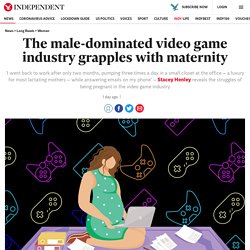
For Jo Haslam, game design director at Snap Finger Click, that is more literal than for most. “My partner (who also works at Snap Finger Click) brought his laptop to the hospital when I went into labour. I gave birth at 9pm, and my partner pushed the release button of our game at 9am the next morning,” says Haslam. 'Barbie: Queen of the Prom' and other bygone games. By Katie Pearce /Published a day ago "You forget to take your pill, thereby trapping one man into marrying you.

Keep him married until he rolls a 4 or a 6. " Several high-profile game developers publicly accused of sexual assault. Back in 2018, Guardian editor Keza MacDonald wrote that “the video games industry isn’t yet ready for its #MeToo moment.”
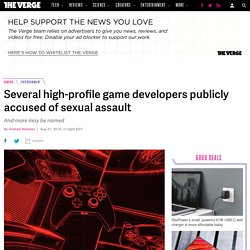
But whether or not that’s still true, people are attempting to hold abusers and their enablers accountable. Over the past day, multiple high-profile men in the video game industry have been accused of sexual assault. Many of the accusations are years old — in some cases, more than a decade — and they all point to a toxic environment where developers not only have to live with a constant fear of abuse, but also the significant professional and personal repercussions of outing their abusers. Things started with a lengthy blog post from artist and game designer Nathalie Lawhead, bluntly titled “calling out my rapist.” Fallout 76 Players Banned For Life After Saying They Plan To 'Eliminate All Gays' Brenda Laurel: Games for girls. From Barbie to Mortal Kombat: Gender and Computer Games - Justine Cassell, Henry Jenkins. Chess For Girls Feminism and Computer Games. Boy On Boy Action - Is Gay Content On the Rise? Rockstar Games is no stranger to controversy.

Its Grand Theft Auto games, for instance, likely have garnered more headlines than any other game in recent memory. For that reason alone, it wasn’t too shocking to see the New York-based developer topping the news once again as it readied its latest release, Bully for the PlayStation 2. Making gender matter: Lessons from tabletop RPG Night Witches. In the oft-cited injunction to diversify the gender of characters in video games, there is a paradox: on the one hand, one does not wish to design female characters with a cardboard array of stereotypes, on the other something can be lost if their gender is made wholly irrelevant to the story, which unfortunate terms like "men with boobs" and what not have been coined to describe.
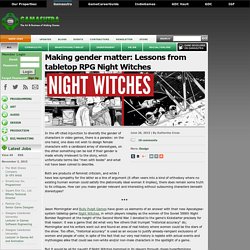
Both are products of feminist criticism, and while I have less sympathy for the latter as a line of argument (it often veers into a kind of orthodoxy where no existing human woman could satisfy the platonically ideal woman it implies), there does remain some truth to its critiques. How can you make gender relevant and interesting without subsuming characters beneath stereotypes? Gender Stereotypes in Gaming. Why does gender balance matter in the games industry? 'Women in games' is an issue that is debated frequently, with passions running high.
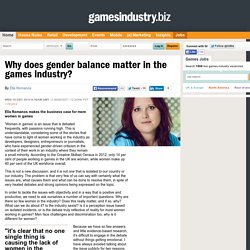
This is understandable, considering some of the stories that have come to light of women working in the industry as developers, designers, entrepreneurs or journalists, who have experienced gender-driven criticism in the context of their work in an industry where they remain a small minority. According to the Creative Skillset Census in 2012, only 14 per cent of people working in games in the UK are women, while women make up 40 per cent of the UK workforce overall. This is not a new discussion, and it is not one that is isolated to our country or our industry. Video games have a diversity problem that runs deeper than race or gender.
Why does sexism persist in the video games industry? Image copyright Ubisoft Is creating female video game characters too much work?

That might sound like a rhetorical question, but it was actually one of the main topics of discussion at this year's E3 conference - the video game industry's biggest event, which ended on Thursday. The issue arose after James Therien, technical director at European gamemaker Ubisoft, told trade publication VideoGamer that the latest instalment of Ubisoft hit Assassin's Creed would not feature any playable female characters because it would have "doubled the work". The reaction was swift - and negative - especially when a former Ubisoft developer questioned how much work would be involved. The gender inequality in core gaming is worse than you think. Statistics show that almost 50 percent of all gamers are women, but this information doesn’t tell the whole story.
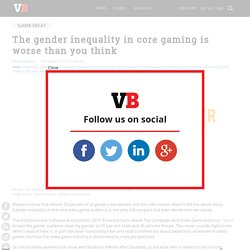
Gender inequality in the core video game audience is not only still rampant but even worse than we realize. The Entertainment Software Association’s 2013 “Essential Facts About The Computer And Video Game Industry” report breaks the gamer audience down by gender to 55 percent male and 45 percent female. This never sounds right to me when I read or hear it, in part because I constantly hear and read commentary about depictions of women in video games and how the video game industry is dominated by male perspectives.
On social media women took issue with BioShock Infinite after Elizabeth, a character who is meant to be a strong protagonist, was referred to as “fragile” in the upcoming Burial At Sea downloadable content. Envisioning The American Dream. What Shall I Be?

By the time I was 11 years old, I had bid my EZ bake oven goodbye and tucked my Tiny Tears doll into her rock-bye crib for the last time. Like most other pre pubescent girls in the mid 1960’s I was ready to target more weighty matters- like what I wanted to be when I grew up. We were, our Weekly Readers told us, a new generation of girls, fueled first by the New Frontier challenges of JFK, now primed and ready to join LBJ’s Great Society. To assist us on our journey was a brand new board game called “What Shall I Be? Barbarian: The Ultimate Warrior. Barbarian: The Ultimate Warrior is a video game first released for Commodore 64 personal computers in 1987; the title was developed and published by Palace Software, and ported to other computers in the following months.
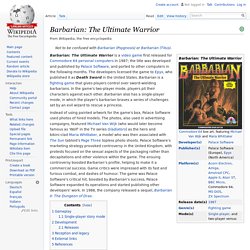
The developers licensed the game to Epyx, who published it as Death Sword in the United States. Barbarian is a fighting game that gives players control over sword-wielding barbarians. In the game's two-player mode, players pit their characters against each other. Gamergate controversy. 10 Blatantly Sexist Video Games. It’s undeniable that the culture of video games has a history of misogyny and is arguably a boy’s club to… It’s undeniable that the culture of video games has a history of misogyny and is arguably a boy’s club to this day. This is hardly a unique observation, and while it’s easy to point at some of the more obvious offenders such as the evolution of jiggle physics, scantily-clad women in fighting games, and by-the-numbers “rescue the princess/your girlfriend” themes over the year.
Such finger-pointing overlooks the more insidious mainstreaming of sexism in gaming culture, to such an extent that an otherwise reasonable, progressive person may become blind or desensitized to it. We’re going to start off easy with some of the more egregious ones that are so over-the- top everyone will be able to laugh, shake their heads, and feel better about themselves, comforted by the fact that while they may crack a few off-color jokes every now and then, there’s no way they’d be that sexist. Gotcha (video game)